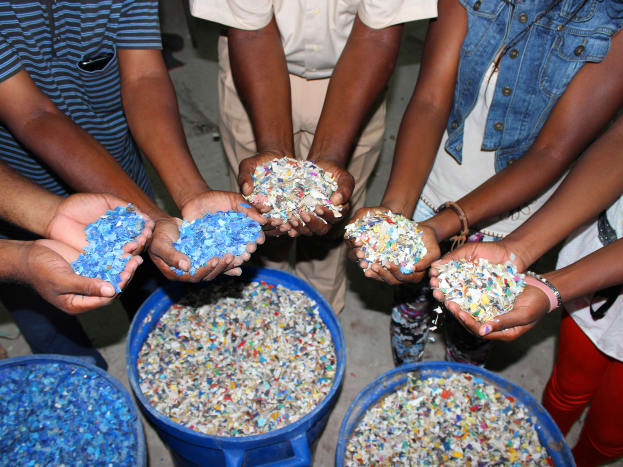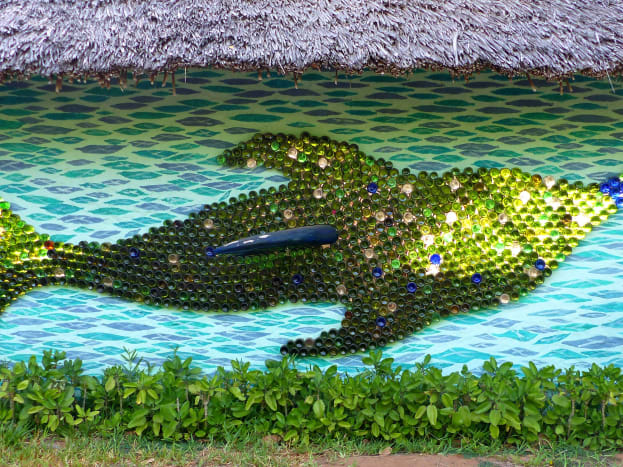Help Save the Planet at EcoWorld Watamu Recycling

MORE KENYA: HEMINGWAYS OL SEKI | HEMINGWAYS NAIROBI | HEMINGWAYS WATAMU | KENYA | KENYA AIRWAYS | RAFFY, SAFARI GUIDE | HEMINGWAYS EXPEDITIONS | DAVID SHELDRICK WILDLIFE FUND
Proper recycling is now more important than ever! Every year an estimated eight million metric tons of plastic waste enters our oceans. Worldwide we use 1.4 billion plastic bottles every single day. Every year more than one million sea turtles, dolphins, sea birds and other animals become entangled and die in marine litter. In 2010, in order to tackle plastic pollution, the Watamu Marine Association (WMA) started a beach-cleaning and plastic-recycling project in partnership with the Watamu Marine Park hotels.
Twenty members of the local community are employed to collect plastic and other marine litter from beaches. In 2014, WMA purchased land and constructed a plastic recycling facility, which operates a plastic crusher machine. The enterprise is also a demo site for small environmental and recycling technologies and best practices. This includes processing biofuel as an alternative to charcoal by making biocharcoal from coconut husks, and biofuel briquettes and biogas production from organic waste.
To date, the enterprize has significantly reduced pollution threats to beaches, the environment and the general community. In addition to the clear environmental benefits, the enterprize raises community education and awareness levels on problems associated with solid waste which have resulted in a cleaner and healthier village.
EcoWorld Watamu is open to the public as a tourist attraction and invites government and educational institutions to use it as a case study and center for learning. We caught up with EcoWorld Watamu to learn more about its mission to create a cleaner world!
FAQs
Everything you need to know before a visit to EcoWorld Watamu.
How was EcoWorld started?
In Watamu, we decided to tackle plastic pollution, and in 2010, the Watamu Marine Association started a beach-cleaning and plastic-recycling project in partnership with the Watamu Marine Park hotels.
How does EcoWorld help employ the local community?
EcoWorld Recycling employs 20 members of the local community to collect plastic and other marine litter from beaches. The collector’s income comes from sales of processed plastic waste to plastic-recycling industries, and from Watamu hotels and business-sector sponsorship in return for waste-management services.

1 / 3
What are the goals for the community?
The project goal is to provide regular employment for disadvantaged women and youth-group members through waste collection and recycling. This in turn brings multiple benefits to the environment and the tourism industry. The project sets a great example of a circular economy by creating plastic-recycling value chains for local communities.
How are the materials repurposed?
In 2019 we aim to recycle 100,000kg (100 metric tons) of plastic and glass waste which will significantly reduce the waste stream flowing to landfill sites and remove marine litter from our beaches.
Plastic waste is machine-crushed and sold to plastic-recycling industries in Mombasa. Recycling goes a step further in innovation and plastic water bottles which have a low recyclable value, are also used in construction to build walls.
Another up-cycling innovation is creating sculptures and art work form flip-flops and other marine litter which provides an income for local community artists. These products are sold in local hotel boutiques and have become popular souvenirs for tourists.

1 / 3
What is one of the best parts about working in Watamu?
Watamu is a place of wild wonders, having beautiful white-sand beaches, vibrant coral reefs, clear blue lagoons and magical mangrove forests. To preserve this natural beauty, the tourism industry and local community works together to create projects like EcoWorld Recycling and to support marine conservation.
What else should we know about EcoWorld?
EcoWorld Recycling is a unique initiative in Kenya and the vision is to replicate this model in other coastal resort towns creating local solutions to the global problem of marine litter and plastic waste.
